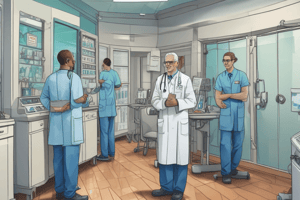Podcast
Questions and Answers
Who wrote the article 'Error in medicine' which was published in JAMA in 1994?
Who wrote the article 'Error in medicine' which was published in JAMA in 1994?
- Mullooly JP
- Roter DL
- Levinson W
- Leape LL (correct)
Which journal published the article 'Improving quality through public disclosure of performance information' in 2002?
Which journal published the article 'Improving quality through public disclosure of performance information' in 2002?
- JAMA
- NEJM
- BMJ
- Health Aff (correct)
What is the primary focus of the article 'Error in medicine'?
What is the primary focus of the article 'Error in medicine'?
- The role of technology in healthcare
- The benefits of public disclosure of performance information
- The importance of effective communication in healthcare
- The reduction of medical errors (correct)
Which of the following is NOT a co-author of the article by Levinson et al.?
Which of the following is NOT a co-author of the article by Levinson et al.?
In what year was the article 'Improving quality through public disclosure of performance information' published?
In what year was the article 'Improving quality through public disclosure of performance information' published?
What is the title of the article written by Leape LL?
What is the title of the article written by Leape LL?
What is the definition of medical errors?
What is the definition of medical errors?
Which of the following are common types of medical errors? (Select all that apply)
Which of the following are common types of medical errors? (Select all that apply)
Near miss medical errors are reported with less frequency than harmful medical errors.
Near miss medical errors are reported with less frequency than harmful medical errors.
What is the main ethical issue related to malpractice?
What is the main ethical issue related to malpractice?
What should be done when a medical error occurs? (Select all that apply)
What should be done when a medical error occurs? (Select all that apply)
There should be no harm or return of ___ according to the hadith.
There should be no harm or return of ___ according to the hadith.
What is the practical disclosure approach?
What is the practical disclosure approach?
Patients prefer limited information about the errors that result in harm.
Patients prefer limited information about the errors that result in harm.
Which of the following statements is true regarding the physician-patient relationship after a medical error?
Which of the following statements is true regarding the physician-patient relationship after a medical error?
Flashcards are hidden until you start studying
Study Notes
Importance of Reporting Medical Errors (MEs)
- Reporting near miss MEs is crucial for quality and safety improvement in healthcare.
- Near miss MEs occur more frequently than harmful MEs and have fewer barriers for data collection.
- Acknowledging nearly missed incidents can help prevent future errors and enhance patient care.
Medical Negligence and Patient Interaction
- Physicians can express empathy by acknowledging adverse events with statements like, “I’m sorry this has happened.”
- Such acknowledgment may be appreciated by patients, fostering trust and transparency in the physician-patient relationship.
Case Study Overview
- The case involved a 23-year-old medical student in the final year of medical school, emphasizing the relevance of education in understanding medical errors.
- The Canadian Adverse Events Study highlighted the incidence of adverse events among hospital patients in Canada, underscoring the need for improved reporting and analysis.
Key References
- Barach and Small highlighted the benefits of public disclosure of performance information in enhancing healthcare quality.
- Leape discussed the prevalence of errors in medicine, drawing attention to systemic issues that contribute to MEs.
Error Reporting and Disclosure
- Medical errors (ME) are defined as the failure of a planned action to be completed as intended and are considered preventable adverse events.
- A medical error can occur from an act or omission deemed wrong by knowledgeable peers at the time.
- Reporting and disclosing medical errors are crucial for improving quality and safety within healthcare.
- "Near miss MEs" are more frequently reported, as they encounter fewer obstacles in data collection compared to harmful MEs.
- Common types of medical errors include surgical errors, medication mismanagement, blood transfusion errors, diagnostic misinterpretations, and equipment failures.
Importance of Error Reporting
- Promotes public trust in the healthcare system.
- Helps prevent future harm to patients.
- Respects patient autonomy and supports the principle of justice.
- Aims to enhance overall safety in medical practice.
Ethical Issues Related to Medical Errors
- Key ethical principles include patient autonomy, beneficence, and non-maleficence.
- Justice demands patients' rights to seek restitution after harm.
- Essential concepts involve truth-telling, confidentiality, informed consent, and transparency in physician-patient relationships.
Islamic Perspectives on Medical Errors
- Islam emphasizes the importance of patient rights and cautions against causing harm, as highlighted in the hadith "There should be no harm or return of harm."
- Recognizes liability for those practicing medicine without proper knowledge or credentials.
- Considers negligence, complications, and the relationship between errors and complications in evaluating medical mistakes.
Practical Disclosure Strategies
- Open disclosure of medical errors fosters public trust, respects patient rights, and prepares a foundation for justice.
- Key points for effective disclosure include acknowledging the error with empathy, explaining the situation simply, and ensuring the patient is stable enough to comprehend the information.
- Immediate reporting of errors and supportive measures for patients and families is essential for accountability and trust.
Occurrence Variance Report (OVR)
- The OVR is a tool for documenting incidents or adverse events within healthcare settings, focusing on risk identification.
- It should include critical details like date, time, location, and involved persons, as well as the degree of harm sustained.
Case Discussion Insights
- Example of a medical student left unsupervised leading to a fatal error reflects on the importance of mentorship and ongoing education about limitations.
- Immediate reporting and communication with patient families are necessary for transparency and adherence to legal requirements.
Conclusion
- Medical errors are relatively common, particularly in specialized fields like surgery and obstetrics.
- Patients desire complete transparency regarding errors that result in harm, including what occurred and preventive measures.
- Disclosure should occur in a timely and supportive manner, leading to increased trust and improved patient care.
- Addressing medical errors swiftly and openly supports the psychological and physical well-being of patients and their families.### Medical Error Disclosure
- Disclosure of medical errors to patients is a significant ethical obligation.
- Public preferences emphasize the need for transparency regarding medical errors.
- Patients generally expect healthcare providers to inform them about errors that affect their care.
Responsibility for Disclosure
- Physicians and healthcare professionals hold the primary responsibility for disclosing errors.
- Ethical guidelines support open communication between providers and patients regarding mistakes.
- The nature of the medical error and its impact on patient care are critical factors in determining disclosure.
Differing Perspectives in Emergency Medicine
- Variations in error identification and reporting exist among emergency medicine provider groups.
- Factors such as training, experience, and institutional policies influence disclosure practices.
Historical Context
- The Institute of Medicine emphasized the importance of addressing medical errors in "To Err is Human" (2000).
- The report aimed to improve patient safety and health system accountability.
Importance of Communication
- Effective physician-patient communication is linked to a reduction in malpractice claims.
- Trust and understanding in the physician-patient relationship are enhanced by transparent dialogue regarding errors.
Public Accountability
- Public disclosure of healthcare performance and error rates can lead to improved medical quality.
- Transparency allows patients to make informed choices about their care providers.
Ethical Considerations
- Discussion of medical errors is also framed within the context of bioethics.
- Ethical frameworks guide the communication of errors, emphasizing honesty, patient welfare, and professional integrity.
Studying That Suits You
Use AI to generate personalized quizzes and flashcards to suit your learning preferences.




